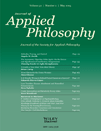

"How (Not) to Criticise the Welfare State".
Journal of Applied Philosophy 32 (2015), 393-409.
This paper assesses John Rawls’s case against the welfare state as a means for implementing socio-economic justice, and for a ‘property-owning democracy’, from both a normative and a methodological point of view. It points out several flaws of Rawls’s critique of the welfare state, through a focus on an existing variety of it – a Swedish-style universal welfare state – which can be said to be relatively successful, both in terms of normative merits (assessed on the basis of liberal egalitarian principles of social justice) and in terms of institutional stability and capacity for self-perpetuation. On this basis, the paper argues that a universal welfare state should constitute the institutional bedrock of Rawlsian social justice, even though it cannot completely fulfil all its requirements. It also develops some reasons to think that, in order to adequately and stably implement those requirements of Rawlsian justice that cannot be fulfilled even by a universal welfare state, the latter should be supplemented by democratic socialism, not by a ‘property-owning democracy’.